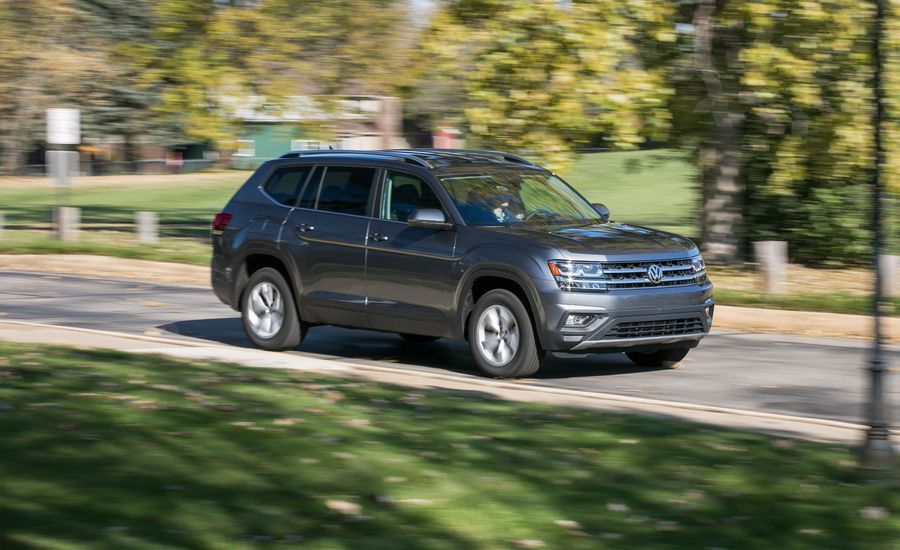MARCH 2018 BY GREG FINK PHOTOS BY CHRIS AMOS
According to the ancient Greeks, the Olympian god Zeus forced the titan Atlas to carry the weight of the heavens on his shoulders for all eternity. Much like the Greek deity it’s named after, the 2018 Volkswagen Atlas is tasked with carrying a heavy burden: attracting more North American consumers to VW showrooms.
HIGHS
Spacious interior, relatively fuel efficient, plush ride.
LOWS
All-wheel drive isn’t available with the 2.0T, not much fun to drive.
Targeting the heart of the three-row, mid-size-crossover market, the Tennessee-built Atlas is available with either a 235-hp turbocharged 2.0-liter inline-four or a 276-hp naturally aspirated 3.6-liter V-6. Both engines are paired with an eight-speed automatic transmission and route torque to the front wheels; all-wheel drive is optional only with the six.

Little Big Four
Despite being down 41 horsepower to the V-6, the Atlas 2.0T SE tested here was surprisingly quick at the track. The little forced-induction four pushed the hulking Atlas from zero to 60 mph in 7.2 seconds and through the quarter-mile in 15.6 at 91 mph. Both figures bettered the results we recorded for an all-wheel-drive Atlas V-6, which needed 7.9 seconds to hit the mile-a-minute mark and 16.0 seconds to cross the quarter-mile at 89 mph.
Credit the Atlas 2.0T’s peppy performance to its comparatively low mass, which, at 4268 pounds, was 460 pounds lighter than the all-wheel-drive Atlas V-6. Additional accelerative assistance comes courtesy of the Atlas 2.0T’s wealth of low-end torque. With 258 lb-ft available from 1600 rpm, the 2.0T offers similar punch to the optional V-6, which produces 266 lb-ft at 2750 rpm. This Atlas 2.0T’s passing times were similar to those of the all-wheel-drive V-6 model. The four-cylinder needed 4.1 seconds to accelerate from 30 to 50 mph and 4.9 to get from 50 to 70 mph, whereas the AWD V-6 performed those tasks in 3.9 and 5.2 seconds. In other words, the story has a much happier ending this time than when Ford tried stuffing a 2.0T in its portly Explorer, where buyers were forced to pay extra to opt for its terminal lagginess.
With less weight to haul around and two fewer cylinders to feed, the Atlas 2.0T was notably thriftier than its V-6 stablemate at the pump. The 2.0T’s EPA estimates of 22 mpg city and 26 mpg highway better the V-6’s 18/25 mpg city/highway ratings (17/23 with all-wheel drive). In our hands, the Atlas 2.0T returned 23 mpg over nearly 2000 miles of driving, while the V-6 managed only 19 mpg. It also sipped fuel at a rate of 27 mpg on our 75-mph real-world highway fuel-economy test, as opposed to 24 mpg for the AWD V-6.

Biggie Smalls
The Atlas 2.0T also changes direction more spiritedly than the V-6 model, and our test car’s 18-inch Continental CrossContact LX Sport all-season tires helped the crossover achieve an impressive 0.86 g around our 300-foot skidpad—0.02 g better than the understeer-prone all-wheel-drive Atlas V-6 SEL Premium on 20-inch examples of the same rubber. Both models ate up 174 feet of tarmac on their way to a halt from 70 mph.
Although the Atlas 2.0T is more enjoyable to drive than its more powerful sibling, it still falls short of the standard set by the Mazda CX-9. The Volkswagen’s steering is well weighted but lifeless, and the capable chassis exudes little of the verve of the Mazda’s, translating to lower driver engagement. Regardless, the Atlas’s smooth and compliant ride is sure to please passengers, as will the crossover’s plentiful interior space, which offers second- and third-row legroom that is significantly larger than the Mazda’s and on par with class giants such as the Chevrolet Traverse and the Honda Pilot.
Slim Trims
The Volkswagen Atlas 2.0T starts at $31,675 for the base S model, which includes LED headlights, separate front and rear climate controls, and a 6.5-inch touchscreen infotainment system. Moving up to the $34,765 SE trim adds niceties such as a proximity key with push-button start, rain-sensing windshield wipers, automatic headlights, heated front seats, a power driver’s seat, an 8.0-inch infotainment touchscreen, and a blind-spot monitoring system.

Our SE test car also came with the $2100 Technology package, which added dual-zone automatic front climate control (three zones in total), a power liftgate, adaptive cruise control, automated emergency braking, and lane-keeping assist. Luxuries such as a panoramic sunroof, a power passenger seat, front and rear parking sensors, and a low-speed reverse automated-braking system are confined to the $40,335 SEL, while a navigation system and a 12.3-inch digital gauge cluster are exclusive to the all-wheel-drive $49,665 Atlas V-6 SEL Premium. A second-row bench seat with room for three is standard across the board, although a pair of individual captain’s chairs can be swapped in for $625 on all but the base S.
With a base price between $1400 and $1730 less than the equivalent front-wheel-drive Atlas V-6, the Atlas 2.0T offers competitively punchy performance with additional fuel efficiency. If you can live without all-wheel drive (and the exclusive features of the flagship, AWD-only Atlas SEL Premium), there’s little reason to pass up the Atlas 2.0T in favor of the V-6.

No comments:
Post a Comment